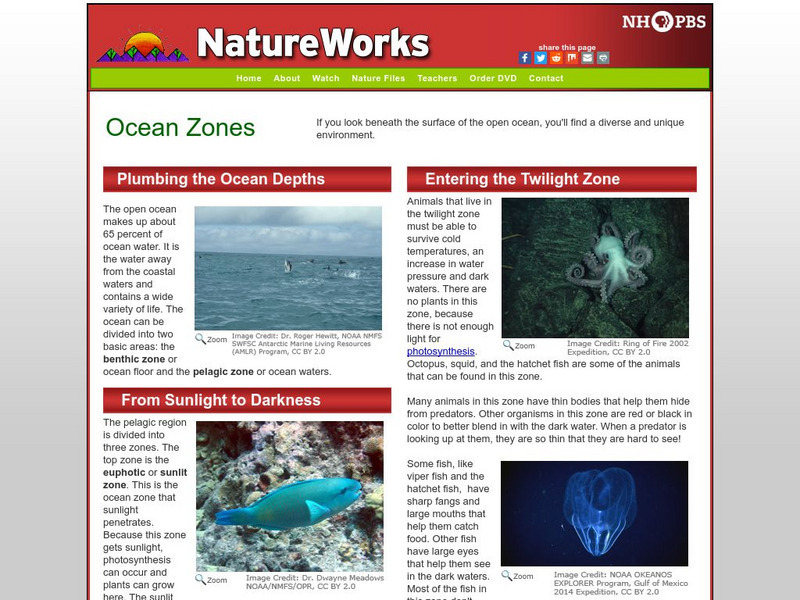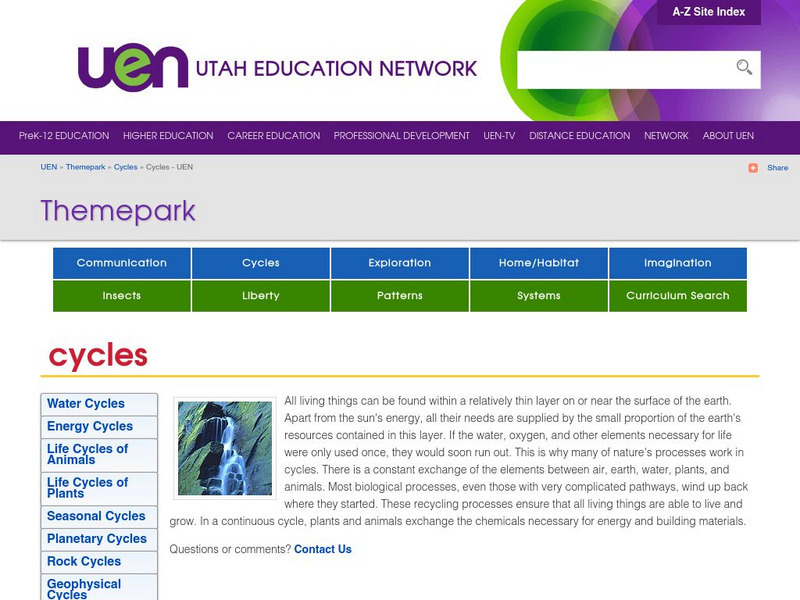American Geosciences Institute
American Geosciences Institute: Why Is Water Special?
An introduction to one of the most diverse natural resources on Earth, water.
CK-12 Foundation
Ck 12: Earth Science: Uses of Water Study Guide
[Free Registration/Login may be required to access all resource tools.] This study guide summarizes the key points about the uses of water. Includes a few questions to check for understanding.
Alabama Learning Exchange
Alex: Water You Doing to Help?
In this lesson from "The Friends of Auntie Litter", (www.auntielitter.org), bodies of water in the Gulf Coast will be explored. Students will also simulate an oil spill. This lesson is one from the "Take Pride Statewide" series. *This...
Thinkport Education
Thinkport: Water, Water, Everywhere: Water Quality Resources
Explore these resources to learn more about the natural and engineered processes that can help contribute to improved water quality.
Other
North Carolina Department of Energy and Natural Resources: Dirt Can Be Dirty
Did you know that the #1 pollutant in North Carolina is dirt? When soil is washed into streams and river, it smothers small animals and fish by clogging their gills. Look for bare patches of ground around your home and around your school...
TeachEngineering
Teach Engineering: Rolling Blackouts & Environmental Impact
The goal is for the students to understand the environmental design considerations required when generating electricity. The electric power that we use every day at home and work is generated by a variety of power plants. Power plants...
PBS
Nh Pbs: Nature Works: Estuaries
Learn more about estuaries when you visit this informative site. This resource provides locations of and weblinks to estuaries in the United States.
PBS
Pbs Nature: Penguins
Did you know that penguins can survive for more than 100 days without food or water? Discover more educational facts about these fascinating birds when you explore this site.
Science Buddies
Science Buddies: Swimming in Acid: Understanding Ocean Acidification
The oceans are a precious natural resource, part of Earth's carbon cycle. But what happens if the oceans absorb too much carbon dioxide? Many scientists are concerned that the increased absorption of carbon dioxide is causing them to...
PBS
Nh Pbs: Nature Works: Rivers and Streams
Learn more about Rivers and Streams through this educational resource. This site features photographs, a description, fun facts, and more about this type of freshwater ecosystem.
The Wonder of Science
The Wonder of Science: K Ess3 3: Environmental Solutions
This NSTA vetted source includes resources to teach ideas on reducing the impact of humans on the environment. Included are assessment ideas, videos, examples, lesson plans, and photos of student work.
PBS
Pbs Nature: Sharks
How many species of sharks are there in the world of water? Students will discover how and where sharks live, what they eat and how they socialize through the exploration of this resource.
National Geographic
National Geographic: Human Impacts on the Environment
Humans impact the physical environment in many ways: overpopulation, pollution, burning fossil fuels, and deforestation. Changes like these have triggered climate change, soil erosion, poor air quality, and undrinkable water. These...
American Geosciences Institute
American Geosciences Institute: Earth Science Week: Properties of Fluids in Reservoirs
This investigation will help students understand the physical relationships between natural gas, oil, and water in a reservoir and how these relationships can affect recovery.
PBS
Nh Pbs: Nature Works: Ocean Zones
Discover more about the underocean environment at this site that surveys animals, environmental factors such as light and temperature, currents, animals, plants, and the like.
Utah Education Network
Uen: Themepark: Cycles
This is a large collection of resources on cycles of nature and the Earth. There is a constant exchange of the elements between air, earth, water, plants, and animals. Most biological processes wind up back where they started. These...
NOAA
Noaa: Estuaries 101 Curriculum: Survival in an Estuary
This activity introduces students to the nature of estuaries, estuarine environmental factors, and four important abiotic factors-pH, temperature, dissolved oxygen, and salinity-and how they vary in estuaries. A PowerPoint presentation,...
State Library of North Carolina
N Cpedia: Lake Mattamuskeet
Lake Mattamuskeet-so named by Algonquian Indians-is North Carolina's largest natural lake. The ancient body of water has not escaped man's intervention. Originally, Mattamuskeet was a shallow, self-contained lake without creeks or rivers...
Travel Document Systems
Tds: Latvia: Geography
Latvia, a country on the Baltic Sea, has thousands of rivers. Find out about these and other bodies of water. You can also read about the climate, natural resources, and terrain. From the CIA World Fact Book.


















